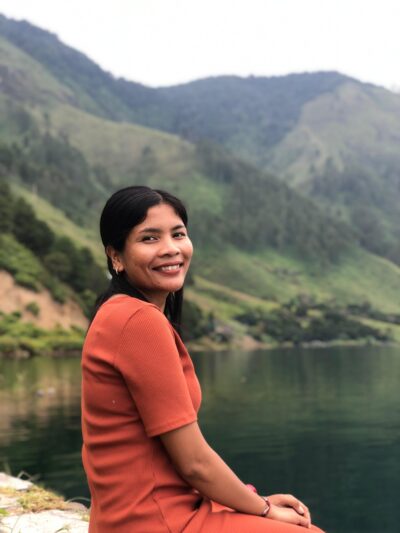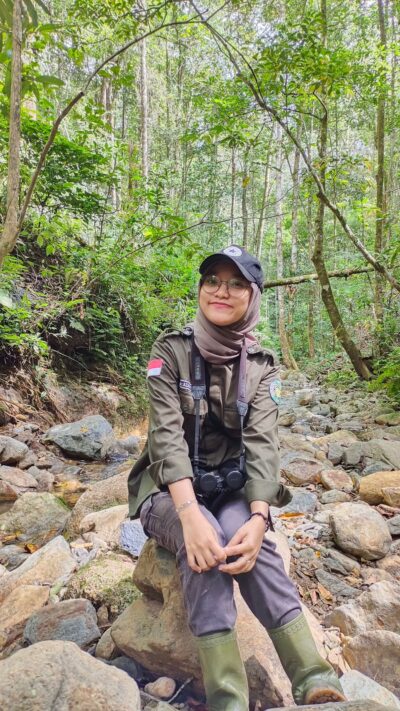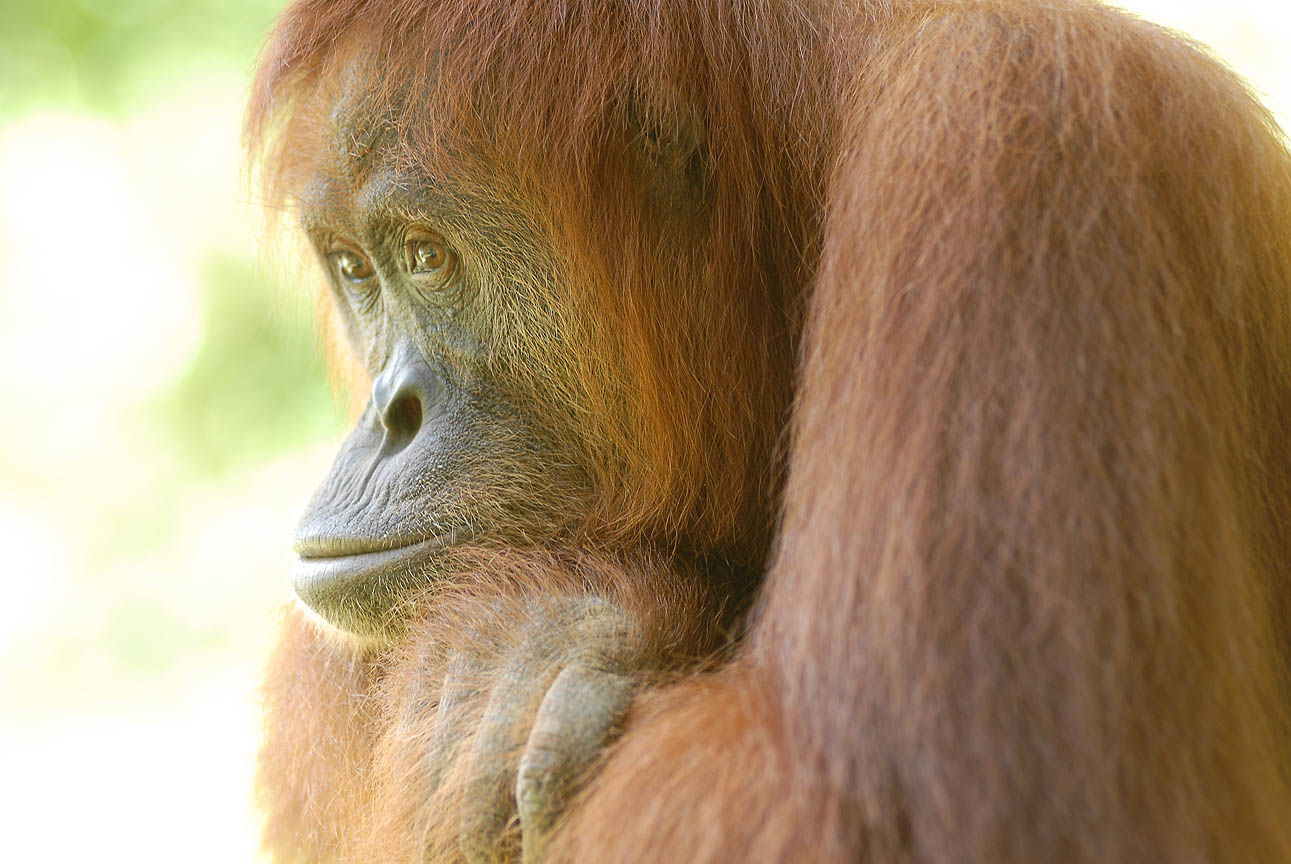A study commissioned by the CARE-WWF Alliance in 2022 highlighted the vital roles that women play in communities and many rural areas of developing countries. These roles include food production and water management – women often act as custodians of nature on a daily basis. Despite this, women are consistently underrepresented in, and face barriers to participating in, more formal natural resource management and climate adaptation decision-making from local to global levels.
However, their research also shows that empowering women can reduce environmental damage, especially when women are engaged in natural resource management and conservation leadership positions. Read the report here.
At SOS we actively champion women in roles across our organisation and in our partners too. SOS is a proudly women-led organisation – from our inspiring CEO Helen Buckland, who’s been leading our work for twenty years, to our newly incumbent Chair of Trustees, Lauren Smart, Chief Commercial Officer at S&P Global (just one of her many impressive hats), women make up a large proportion of our team. These women, and the expertise they bring, are a key to our success as an organisation that cares not just about orangutans and nature, but about a better world for people too.
We’re also proud that so many of the staff in our frontline conservation partner organisations, as well as the other experts we work with, are women. The teams at OIC and TahuKah have many women leading and contributing to their vital conservation programmes, while experts like Dr. Liana Chua, Professor of Social Anthropology at the University of Cambridge, help to guide our conservation approaches.
At SOS we believe gender equality, and ensuring that women are empowered and involved in conservation efforts ‘from the ground up’, is not only vital for women themselves, but brings excellent benefits for society, nature and the climate.
“We see that conservation issues are inseparable from social, economic and cultural systems, both in the communities living in areas of high conservation value and the global community more broadly.”
- Ms. Intan Violetta, TaHuKah Community Facilitator

I work at Tahukah as a Landscape Manager working with the team at Pakpak Ecological Landscape. We carry out work in the field of conservation to make a good contribution to the protection and sustainability of the environment and wildlife. To support this work, I coordinate with the field team and management to plan activities at the landscape level. I report directly to management and the director to provide updates on how Tahukah’s activities impact the community and the environment. I work with the director to build communication and relationships with stakeholders, such as district governments, forestry offices in the region, and the state conservation agency, with the aim of building good relationships and to share in the goal of protecting forest areas and wildlife animals.
This work is very important to me as an individual and as a woman because it relates to the community and the environment. We learn from each other with the community how to manage forests sustainably and protect wildlife. We work not only to improve the welfare of communities living adjacent to forest areas, but also to work together to protect the forests and wildlife. This work involves a lot of people, both women and youth. Therefore, it is very important to keep doing this work and make an impact on those who are vulnerable to climate change that could become very extreme in the future. If there are no people who give themselves and care about protecting the environment, we cannot imagine how nature will be in the future. There will no longer be a good and fair place for us.
The thing I am most proud of in this job is how the organisation builds good relationships with communities and stakeholders at all levels to jointly safeguard and protect the environment and forest areas. We have attempted to be inclusive and involved all parties because conservation work is often seen as masculine and usually only done by men. However, nowadays conservation work also involves women, both in institutions and in villages. I am proud to be one of the women involved in this work. We approach the community and work together with the community to do many things, such as rehabilitating cultivated land by building tree and fruit nurseries.
his work also makes me proud because as a woman I feel that I have contributed to fighting climate change, together with local communities to fight for the right to access natural resources without destroying them through social forestry. The role and involvement of women is very important as agents of change to preserve nature where our lives rely on.
Women and girls are the most vulnerable to climate change; vulnerable to declining health and reproductive health and vulnerable to ecological and economic impacts. Women must take a role in conservation for environmental protection and sustainability because women are at the forefront of defending natural resources. Women must show that the relationship between gender, justice, and environmental conservation is very close. The role of women in making decisions related to environmental sustainability must be considered because it relates to future generations. Women are mothers and they should ensure that their families and future generations live in a safe and comfortable environment. Therefore, it is time for women to be involved in environmental conservation issues.

I work at Tahukah as a village facilitator with a team in the Batang Toru Ecological Landscape. We work in the field of conservation, which means the protection of the environment and biodiversity. As a village facilitator, I live in the village to identify and analyse problems and gather insights from below. In addition, using an ethnographic approach, we mingle with community members to learn more intimately about the dynamics and complexity of social and economic issues and gain the genuine trust of the community.
My role as a village facilitator is a very important one as it is involved directly with the people closest to our conservation activities. We cannot ignore the social, economic and cultural systems that prevail at the grassroots level.
I believe one of the main factors driving landscape change is the complex network of relationships and needs in a community. As people go about meeting their needs for survival and wellbeing, they will interact with their local environment, which in our case can be areas of high conservation value
We should always remember that through the course of history people have been highly adaptive to various influences and development projects, so building trust with them for a longer term is a key prerequisite for successful conservation. By taking these kinds of things into account, I believe that we can formulate more targeted conservation activities.
I play the role of a ‘bridging person’ connecting the community, Tahukah, and other actors involved in the overall conservation activities.
I feel so grateful as I have been able to apply and expand the knowledge and skills that I had previously learnt from college. My knowledge in forestry can be applied directly in the field. But more than that, skills in ethnography became a much-needed work tool that I learnt on the job. In this way, I see that the whole approach that we employ has encouraged me to learn more about Batak society, especially about kinship systems and the relationship between cultural systems and forests and wildlife. As a Batak person who grew up in an urban area, I feel that my work has helped me to learn more about other Batak communities who live in rural areas and interact more closely with forests and wildlife. In the midst of the Batak patrilineal system and conservation activities that have been seen as masculine, I find out that providing another alternative perspective on conservation activities from my position and perspective as a woman is a great challenge worth taking.
In general, I feel that support for women to work in any sector should continue and be intensified, including in conservation. As we might know, environmental degradation and the increasingly severe impacts of climate change have threatened the roles traditionally played by women, for example in agricultural land management. They have become among the main social groups most affected by environmental degradation and climate change. Therefore, women actors in conservation will play a crucial role in solidarity with women around the world across different living spaces. I am convinced that there are many gaps that cannot be filled by anyone other than women and a combination of women and men, especially to reorganise social, economic and cultural systems to be more equitable and sustainable for all.
–
We hope you have enjoyed hearing from these conservation heroes! We are always so inspired by the dedication shown by these women, engaged on the frontline in Sumatra to protect rainforests so wild orangutans and forest edge communities can thrive.
If you feel inspired too please consider making a donation today – £34 can fund one of these conservation heroes to monitor sapling growth and log tree survival rates as part of a rewilding project designed to provide vital improvements to local biodiversity as well as helping to fight climate change. Importantly these trees can also provide canopy strong enough for orangutans to nest in after just three years! Thank you!
You can help protect Sumatra's Orangutans. Click to get updates
